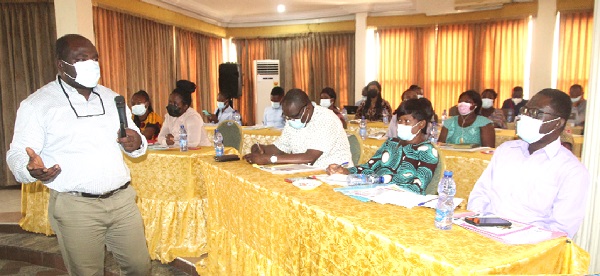
Primary healthcare staff trained on non-communicable diseases
The Ghana Health Service (GHS) is building the capacity of primary healthcare workers on the prevention, early detection and management of non-communicable diseases (NCDs) in the country.
The effort, being done with support from the World Health Organisation (WHO), is to bridge the NCD care knowledge gap at the primary healthcare level.
Advertisement
It is part of efforts to reduce the surge in NCDs due to care deficit and unhealthy lifestyles.
The five-day capacity-building programme in Accra is a pilot that will inform the streamlining of NCD education, prevention, early diagnosis and management in the primary healthcare system.
GHS statistics suggest at least 15 people die prematurely from NCDs.
NCDs are diseases that do not spread from person-to-person contact.
They are generally considered chronic diseases (generally of long duration, slow progression), and generally include cardiovascular diseases, diabetes mellitus, cancers, injuries (intentional and unintentional); asthma/chronic obstructive pulmonary disease, sickle cell disease, mental health conditions such as depression, anxiety disorders, schizophrenia, among others.
Diagnoses capacity
At the opening of the five-day meeting, a representative of the GHS, Dr Yaw Amoako, said capacity building had become necessary because the capacity to diagnose, identify risks and vulnerabilities, as well as to offer care, were limited at the primary healthcare level.
He said as a result, the WHO had put together a minimum set of cost-effective interventions that could be delivered to improve coverage of appropriate NCD services to all who needed it at the primary healthcare level.
The set has been named “The WHO package of essential NCD interventions for primary healthcare (WHO-PEN)”.
Dr Amoako said the participants were being introduced to the WHO-PEN, after which they were expected to be able to assess all clients to determine who was eligible for NCDs screening and referral.
"They should also be able to provide accurate information for client counselling on cardiovascular diseases, diabetes, cancers, oral health, healthy lifestyle, palliative care, mental health and self-care strategies," he said.
He said the NCD surge should be a cause for worry because many of the cases and deaths were preventable through the adoption of healthy lifestyles and early detection, while treatment was expensive and might be lifelong.
Dr Amoako, who also works with the Komfo Anokye Teaching Hospital, said the five main risk factors across most NCDs, which were behaviour-related, were tobacco use, physical inactivity and unhealthy diet, harmful use of alcohol and air pollution, which presented in individuals as raised blood pressure, overweight/obesity, raised blood glucose and raised cholesterol.
Healthy diet
The Ayawaso-West Director of Health Services, Dr Louisa Matey, said a healthy diet provided protection against NCDs such as diabetes, heart diseases, stroke and cancer, saying a healthy eating habit could reduce vulnerability to NCDs occasioned by lifestyle by 80 per cent.
Writer’s email: [email protected]




